Rob Bignell's Blog, page 343
February 21, 2014
How to stay focused on writing one book
Sometimes inspiration 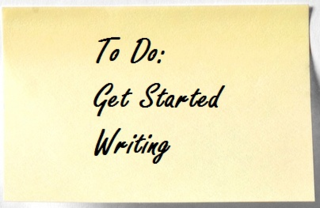 strikes for an entirely different book than the one you're working on. Unfortunately, this can create the problem of stopping one book and starting a new one so that your original work never gets finished.
strikes for an entirely different book than the one you're working on. Unfortunately, this can create the problem of stopping one book and starting a new one so that your original work never gets finished.
The odds are that the new project you started won’t get completed either, though. You'll come up with another great idea for a book and start working on that one.
Fortunately, there are plenty of ways to stay focused on writing one book:
g Limit new project ideas to note taking – If an idea comes to you for a new book, quickly jot it down and forget about it. Keep those notes in a separate folder or file. That means no research on the new book, no outlines of it, no writing character sketches, etc.
g Set a deadline – If you can write 2,000 words a day, you'll need 35 days to write a 70,000 word novel. Being realistic – you may be ill, holidays occur, emergencies with the kids happen – give yourself a few extra days. So, that means in 50 days you will complete your novel. That means no other writing can interfere with your goal of 2,000 words a day for about two months.
g Dedicate time slots – If you need two hours to write those 2,000 words, then set aside two specific hours each day in which you only work on your book. Nothing else can be written during that time.
g Bet on yourself – One wild trick I've heard some writers successfully use is to give a hundred dollars cash to a close, trustworthy, relative or friend. When you complete the novel and show it your relative/friend, then you get the money back. You need not use money; perhaps you instead agree with your spouse that if you don't complete the novel by a specific date, you will do the one chore you absolutely hate to do for the next two months.
Need an editor? Having your book, business document or academic paper proofread or edited before submitting it can prove invaluable. In an economic climate where you face heavy competition, your writing needs a second eye to give you the edge. I can provide that second eye.
Amazon.com WidgetsRelated articles
 Don't let perfectionism strangle your creativity
Don't let perfectionism strangle your creativity Motivate yourself to write this year!
Motivate yourself to write this year! Select right word to avoid reader confusion
Select right word to avoid reader confusion Mimic sounds to appeal to sense of hearing
Mimic sounds to appeal to sense of hearing Why you should avoid being sensational
Why you should avoid being sensational
February 20, 2014
How to get rid of Word’s proofreading marks
Among the 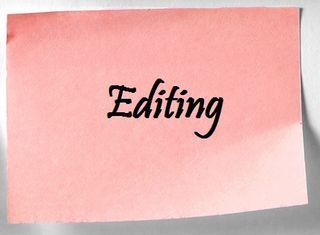 most annoying features of Microsoft Word’s Track Changes program is that every time you reopen a file, the corrections show up. To not see the corrections, you have to toggle the “Display for Review” setting to “No Markup.”
most annoying features of Microsoft Word’s Track Changes program is that every time you reopen a file, the corrections show up. To not see the corrections, you have to toggle the “Display for Review” setting to “No Markup.”
This is a default setting because Microsoft says it doesn’t want you to share with others an edited document in which you haven’t approved the corrections. That approach may be fine for micromanagers and control freaks in the corporate world, but for the rest of us, most of the time it’s just plain annoying.
The easy solution to the problem, Microsoft says is to approve or disapprove of each correction. But if you receive a manuscript back from an editor with several hundred proofreading corrections, that’s a time-consuming task that you probably consider unnecessary.
Fortunately, you can change the default setting so those pesky proofreading corrections don’t show up every time you open a file. Rather than have the default setting open your Word file in “All Markup” mode and instead have it open in “No Markup” mode, do this:
g Open your document
g Click “File”
g Click “Options” (in Word 2010, it appears at the bottom of the page’s left side); a new window will pop-up
g Click “Trust Center” in the new window’s left menu; this changes the options in the right pane
g Click in the right pane “Trust Center Settings”; this in turn opens another window
g Click in the new window’s left pane “Privacy Options”
g Uncheck “Make hidden markup visible when opening or saving” in the new window’s right pane
g Click “OK” on both open windows
Test your document by closing and then reopening it. No proofreading marks should show. If you do want to see them, simply change the Track Changes setting to “All Markup” and then under the “Show Markup” dropdown menu, check the types of corrections you wish to see.
Need an editor? Having your book, business document or academic paper proofread or edited before submitting it can prove invaluable. In an economic climate where you face heavy competition, your writing needs a second eye to give you the edge. I can provide that second eye.
Amazon.com WidgetsRelated articles
 How to find a good editor or proofreader
How to find a good editor or proofreader How to format line spacing for an ebook
How to format line spacing for an ebook How to use Track Changes on your manuscript
How to use Track Changes on your manuscript
February 19, 2014
Scrubbing out those cleanup vs. clean up errors
Many writers  misuse clean up and cleanup. Time to sweep away those errors!
misuse clean up and cleanup. Time to sweep away those errors!
Cleanup is a noun that means making something clean. Metaphorically, it also is used to indicate that someone has made a lot of money or that a complete job was done. For example: After the party, only a few of the so-called volunteers actually helped with the cleanup.
Clean up is a verb that shows someone in the act of cleaning. By extension, it also can be used to show that someone is making a lot of money. For example: I volunteered to clean up the hall after the big bash.
Now that you know the difference, you writing should be all spick–and–span from here on out!
Need an editor? Having your book, business document or academic paper proofread or edited before submitting it can prove invaluable. In an economic climate where you face heavy competition, your writing needs a second eye to give you the edge. I can provide that second eye.
Amazon.com Widgets
Related articles
 Do the right thing: Altar vs. alter
Do the right thing: Altar vs. alter Don't scam your readers: Rip-off vs. rip off
Don't scam your readers: Rip-off vs. rip off Sort it all out: Councilor vs. counselor
Sort it all out: Councilor vs. counselor Mimic sounds to appeal to sense of hearing
Mimic sounds to appeal to sense of hearing Motivate yourself to write this year!
Motivate yourself to write this year!
February 18, 2014
Vary syntax to give writing flavor, texture
When writing, 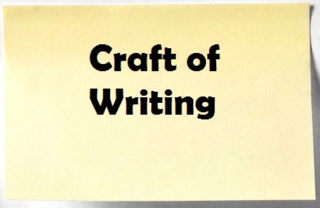 you’ll want to vary the syntax, which is the pattern of the sentence’s words – that is, the order of the parts of speech within a sentence.
you’ll want to vary the syntax, which is the pattern of the sentence’s words – that is, the order of the parts of speech within a sentence.
A standard sentence pattern in English is the Subject-Verb-Direct Object, as in Aunt Janie sewed the button on my shirt, in which Aunt Janie is the Subject (or who the sentence is about), sewed is the Verb (or tells what the Noun did), and the button on my shirt is the Direct Object (or who the Subject did the Verb to).
But an English sentence can be structured a number of different ways. For example, you might use a Verb-Subject pattern, as in Run Shelly! in which Run is the Verb (or what the Subject should do) and Shelly is the Subject (or who the sentence is about).
If you don’t vary your syntax, the writing will sound stilted. In addition, your sentences will be about the same length, resulting in paragraphs that sound monotone. It would be like ordering a banana split and getting a big bowl of only vanilla ice cream. Varying the syntax adds flavor and texture to your writing.
Because of the English language’s grammar, most of your sentences will be S-V-DO. But placing modifiers in different locations of the sentence can add textual variety. For example, you could write Concentrating on the work before her, Aunt Janie sewed the button on my shirt in which Concentrating on the work before her is a modifier showing how Aunt Janie (the Subject) is sewing.
Of course, there are times when you may not want to vary the sentence structure. One is for rhetorical effect. Consider these lines from Martin Luther King Jr.’s famous “I Have a Dream” speech:
I have a dream that one day this nation will rise up and live out the true meaning of its creed: “We hold these truths to be self-evident: that all men are created equal.”
I have a dream that one day on the red hills of Georgia the sons of former slaves and the sons of former slave owners will be able to sit down together at the table of brotherhood.
I have a dream that one day even the state of Mississippi, a state sweltering with the heat of injustice, sweltering with the heat of oppression, will be transformed into an oasis of freedom and justice.
I have a dream that my four little children will one day live in a nation where they will not be judged by the color of their skin but by the content of their character.
The reason those lines work despite the unvarying sentence structure is because by repeating certain key words and the same sentence structure, they have a rhythm to them, much like a poem or song lyric. Just as importantly, the wording in the sentences evoke powerful images that tap into our emotions and humanity.
Another instance in which you may wish to repeat the same sentence structure is when developing a character. If you wish to show that the character has a dull personality, perhaps that person will speak this way. Don’t overdo it, though, as after a while this can grate on a reader.
Ultimately, you want to vary sentence length (and structure) in your writing. The rhetorical effect of repetition works best when it is not overdone.
Need an editor? Having your book, business document or academic paper proofread or edited before submitting it can prove invaluable. In an economic climate where you face heavy competition, your writing needs a second eye to give you the edge. I can provide that second eye.
Related articles
 Select right word to avoid reader confusion
Select right word to avoid reader confusion Don't scam your readers: Rip-off vs. rip off
Don't scam your readers: Rip-off vs. rip off
February 17, 2014
Editor appears at Local Author Extravaganza!
A special  thanks to Chapter2Books in Hudson, Wis., for hosting the “Local Author Extravaganza!” on Saturday, Feb. 15. More than a dozen authors (including yours truly) from west-central Wisconsin and the Twin Cities were on hand throughout the day to meet with readers and sign books. Chapter2Books, which has long carried books by a number of local and regional authors, likely will change its location in March, so stay tuned for its new location.
thanks to Chapter2Books in Hudson, Wis., for hosting the “Local Author Extravaganza!” on Saturday, Feb. 15. More than a dozen authors (including yours truly) from west-central Wisconsin and the Twin Cities were on hand throughout the day to meet with readers and sign books. Chapter2Books, which has long carried books by a number of local and regional authors, likely will change its location in March, so stay tuned for its new location.
Need an editor? Having your book, business document or academic paper proofread or edited before submitting it can prove invaluable. In an economic climate where you face heavy competition, your writing needs a second eye to give you the edge. I can provide that second eye.
Amazon.com WidgetsRelated articles
 Metro paper features editor's hiking book
Metro paper features editor's hiking book Book now for sale at Chapter 2 bookstore
Book now for sale at Chapter 2 bookstore Editor releases fifth 'Hittin' the Trail' book
Editor releases fifth 'Hittin' the Trail' book
February 16, 2014
Five Great Quotations about Book Critics
“When a 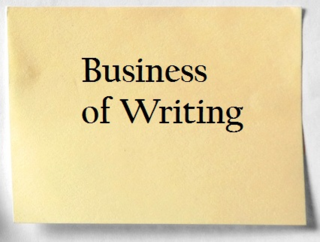 man publishes a book, there are so many stupid things said that he declares he’ll never do it again. The praise is almost always worse than the criticism.” – Sherwood Anderson
man publishes a book, there are so many stupid things said that he declares he’ll never do it again. The praise is almost always worse than the criticism.” – Sherwood Anderson
“Honest criticism is hard to take, particularly from a relative, a friend, an acquaintance, or a stranger.” – Franklin Jones
“Confronted by an absolutely infuriating review it is sometimes helpful for the victim to do a little personal research on the critic. Is there any truth to the rumor that he had no formal education beyond the age of eleven? In any event, is he able to construct a simple English sentence? Do his participles dangle? When moved to lyricism does he write ‘I had a fun time’? Was he ever arrested for burglary? I don’t know that you will prove anything this way, but it is perfectly harmless and quite soothing.” – Jean Kerr
“Nature fits all her children with something to do, He who would write and can’t write, can surely review.” – James Russell Lowell
“A critic knows more than the author he criticizes, or just as much, or at least somewhat less.” – Cardinal Manning
Need an editor? Having your book, business document or academic paper proofread or edited before submitting it can prove invaluable. In an economic climate where you face heavy competition, your writing needs a second eye to give you the edge. I can provide that second eye.
Amazon.com WidgetsRelated articles
 Five Great Quotations about the Power of Writing
Five Great Quotations about the Power of Writing Five Great Quotations about Why We Must Write
Five Great Quotations about Why We Must Write Motivate yourself to write this year!
Motivate yourself to write this year! Work off the fat from overwritten descriptions
Work off the fat from overwritten descriptions Use consistent quotation mark, apostrophe style
Use consistent quotation mark, apostrophe style
February 15, 2014
How to pen engaging dialogue for your story
No doubt  your story will include dialogue in which characters speak to one another. Unfortunately, too many beginning writers drag their story into a furrow of tedium by poorly handling dialogue. The problem is that their characters’ dialogue mirrors actual conversations too closely.
your story will include dialogue in which characters speak to one another. Unfortunately, too many beginning writers drag their story into a furrow of tedium by poorly handling dialogue. The problem is that their characters’ dialogue mirrors actual conversations too closely.
Realistic dialogue in a story isn’t a copy of how we really speak in everyday life. Our daily conversations are filled with niceties, formalities, repetition and the mundane. They often are tedious and even banal.
Writers can’t afford to waste a word of their story on such dialogue. Instead, they should keep in mind that dialogue in a story – unlike real life – always must have a conversational goal. Dialogue is a means of characterization, a way for characters to push forward their agenda vital to the plot. Characters engage in competition and verbal combat via their dialogue.
Compare the following dialogue examples. This one attempts to mimic real life conversation:
“You know, Upir, I’ve changed. I just can’t help you.”
The alien raised his hands. “But what of Ala and I? It took all three of us to lure the human spacecraft to that asteroid.”
“But two of the humans died when the spacecraft crashed! I was the test subject for us; I volunteered so you would not die if it didn’t work!”
“Well then, why did you leave us there?”
“It was the jump, it made me mad, you know. I did not know what I was doing!”
“You do now, right?”
“Yeah, I do. But I am powerless. You see, once human, you no longer can jump.”
“Yeah, I know.”
“You do? How?”
“The humans sent a rescue craft. Ala was near death, so he jumped.”
“Oh, I see.”
The following example more succinctly indicates the characters have goals to achieve. They use their conversation to further their personal agendas:
“I’ve changed, Upir. I can’t help you.”
“You know what will happen if you don’t do as I say.”
“I’m not cold anymore, Upir.”
The alien raised his hand like a cat ready to strike. “Yes, Raphaelie, I can see that. You’ve got what you wanted. But what of Ala and I? It took all three of us to lure the human spacecraft to that asteroid. You will make amends for what you did.”
“But two of the humans died when the spacecraft crashed! I was the test subject for us; I volunteered so you would not die if it didn’t work!”
“Then why did you leave us there?”
“It was the jump, it made me mad. I did not know what I was doing!”
“But you do now.”
“I am powerless. Once human, you no longer can jump.”
“I know.”
“How?”
“The humans sent a rescue craft. Ala was near death. He jumped.”
“Why didn’t you?”
“Because I wanted you.”
Which one was more interesting to read?
Need an editor? Having your book, business document or academic paper proofread or edited before submitting it can prove invaluable. In an economic climate where you face heavy competition, your writing needs a second eye to give you the edge. I can provide that second eye.
Amazon.com WidgetsRelated articles
 Downgrade your minor characters
Downgrade your minor characters Constructing your story's main character
Constructing your story's main character Use YouTube to promote your book
Use YouTube to promote your book Delete bookisms in your story's dialogue
Delete bookisms in your story's dialogue Mastering the fine art of dialogue punctuation
Mastering the fine art of dialogue punctuation
February 14, 2014
Speak about book’s topic to various groups
When  promoting your book, you don’t have to limit public appearances to book signings or radio/television interviews. You might consider creating a presentation related to your latest book’s topic and then finding places to present it. Of course, your book(s) will be on a hand for sale, and you’ll be introduced as the author and such-and-such title. In short, you’re using your status as an author to speak to a group rather than pitching yourself as someone with a book to sell.
promoting your book, you don’t have to limit public appearances to book signings or radio/television interviews. You might consider creating a presentation related to your latest book’s topic and then finding places to present it. Of course, your book(s) will be on a hand for sale, and you’ll be introduced as the author and such-and-such title. In short, you’re using your status as an author to speak to a group rather than pitching yourself as someone with a book to sell.
Some possible organizations or groups where you might make a presentation include:
g Book clubs
g Civic groups (such as Chamber of Commerce, Lion’s Club, Toastmasters, etc.)
g College classes (Unless you wrote a book for children or teens, shy away from classes with minors, as they don’t buy books.)
g Organizations related to your book topic (e.g. if your book is about hiking, speak to the local hiking club?)
g Women’s organizations
g Writer’s groups
Don’t forget to promote your appearance in the local media and on your social media platforms. Hopefully, local media will cover the event, giving you another outlet for selling your book!
Need an editor? Having your book, business document or academic paper proofread or edited before submitting it can prove invaluable. In an economic climate where you face heavy competition, your writing needs a second eye to give you the edge. I can provide that second eye.
Amazon.com Widgets
Related articles
 Tips to ensure a successful book reading/signing
Tips to ensure a successful book reading/signing Create book sell sheet for pitching book
Create book sell sheet for pitching book Use YouTube to promote your book
Use YouTube to promote your book Why you want an LCCN for your book
Why you want an LCCN for your book Five Great Quotations about Why We Must Write
Five Great Quotations about Why We Must Write
February 13, 2014
Getting started with formatting your ebook
If you 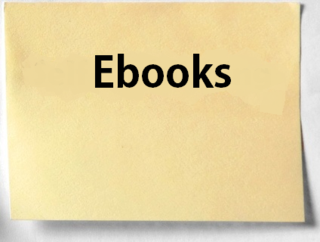 have a completed manuscript, you actually should to format two ebooks – one for Kindle and one for Smashwords. This actually is less work than it sounds as you can format an ebook that will work for both Kindle and Smashwords.
have a completed manuscript, you actually should to format two ebooks – one for Kindle and one for Smashwords. This actually is less work than it sounds as you can format an ebook that will work for both Kindle and Smashwords.
Why create an ebook for these two retailers?
You’ll want to go with Kindle because it dominates the market. As of the beginning of 2014, about two out of three ebooks are sold on Kindle. Not going with Kindle is like selling your paper book in only 16 of the 50 states (at best). You’ll also want to use Smashwords so you have a version of your book available in Nook, iPad, Kobo or Sony Reader. Smashwords is a one-stop shop for accomplishing this and much easier than developing a separate ebook for each ereader device and uploading it at its respective company site. By uploading your ebook to both Kindle and Smashwords, you’ll reach about 98 percent of the ereader market in North America.
As Kindle is much more flexible than Smashwords in how the file you upload can appear, follow the latter’s guidelines when creating an ebook. Having said that, you should still create an ebook for Kindle first, as you’ll be able to better review it online to ensure it looks good and as we’ll need to add wording to the title page to get it uploaded on Smashwords.
Since Kindle offers unique marketing opportunities for books that it exclusively sells, you may want to only upload to Kindle and not Smashwords. Still, by formatting your Kindle ebook manuscript for Smashwords means that once those promotional opportunities are used up, you’ll have an ebook that can be quickly uploaded to Smashwords to sell books at Barnes & Noble, Apple and so on.
Start by creating a Microsoft Word document. Call it whatever you like (I usually go with the book’s title) but include the word KINDLE in its name. Make sure it’s a .doc file rather than .docx or .rtf. While Kindle accepts all of these file types, Smashwords only accepts .doc.
Changing the Word document so that it’s a .doc is simple. Go to “save as” and on the pop-up window that asks you where to save the file, change “save file as” to “Microsoft Word 97 - 2003 Document”.
Next, set up your .doc file for formatting so it:
g Uses regular typeface in one font size
g Uses single spacing with a line spacing of 1.0
g Does not use the “Add Space Before Paragraph” or the “Add Space After Paragraph” function
g Does not have any pre-set tabs
g Uses normal margins, as you would for typing a letter
g Uses Align Left so that the right margin is ragged
Next, open Notepad on your computer and copy and paste your manuscript to it. This deletes a lot of hidden coding that likely will be a problem for you as formatting your ebook. Finally, cut and paste the manuscript from Notepad to your new .doc. Be forewarned that if you have tables and charts in your Word manuscript, using Notepad almost certainly will mess up their appearance. You’re much better off to convert tables and charts into photos that you’ll later insert at the appropriate spots in your ebook.
Now you’re ready to get into the nitty-gritty of formatting – which we’ll cover in future blog entries.
Need an editor? Having your book, business document or academic paper proofread or edited before submitting it can prove invaluable. In an economic climate where you face heavy competition, your writing needs a second eye to give you the edge. I can provide that second eye.
Amazon.com WidgetsRelated articles
 Use consistent quotation mark, apostrophe style
Use consistent quotation mark, apostrophe style How to format line spacing for an ebook
How to format line spacing for an ebook How to link your ebook's table of contents
How to link your ebook's table of contents Will you take advantage of ebook's opportunity for innovative storytelling, content presentation?
Will you take advantage of ebook's opportunity for innovative storytelling, content presentation?
Editor appearing at Hudson book event Saturday
You’ll can 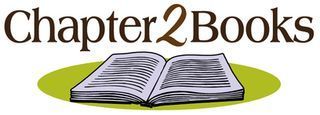 meet a number of west-central Wisconsin and Twin Cities writers – including yours truly – at the Local Author Extravaganza! on Saturday, Feb. 15 from 11 a.m. to 4 p.m., at Chapter2Books in historic downtown Hudson.
meet a number of west-central Wisconsin and Twin Cities writers – including yours truly – at the Local Author Extravaganza! on Saturday, Feb. 15 from 11 a.m. to 4 p.m., at Chapter2Books in historic downtown Hudson.
Since opening, Chapter2 has done a fantastic job of carrying books by regional authors, as well as offering a wide selection of other titles, including an impressive collection of children’s books.
A partial list of the authors who will be at Saturday’s event include Kate Hopper, William Kent Krueger, Christine Husom, Jeannie Roberts, Connie Kingrey, Dan Woll, Sarah Stonic, Michelle Sailor, Susan Sims Moody, Gary Porter, Barbara Deese, Lee Kisling, David Housewright, Jaclynn Heron, Carolyn Bohlke, Joanne Vruno, and Mike Yurk. My time slot is 11 a.m. to 2 p.m.
You can chat with the authors, have them autograph their books, and you might even be able to talk a couple into reading from them. Chapter2Books is located at 422 2nd St., Hudson, Wis.
Need an editor? Having your book, business document or academic paper proofread or edited before submitting it can prove invaluable. In an economic climate where you face heavy competition, your writing needs a second eye to give you the edge. I can provide that second eye.
Amazon.com WidgetsRelated articles
 Book now for sale at Chapter 2 bookstore
Book now for sale at Chapter 2 bookstore



